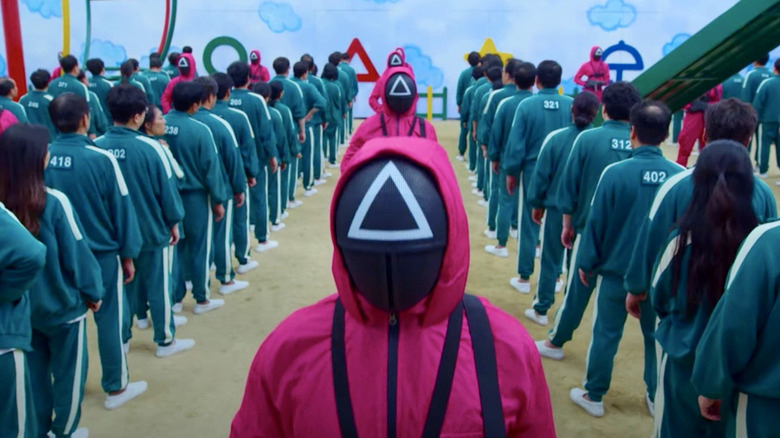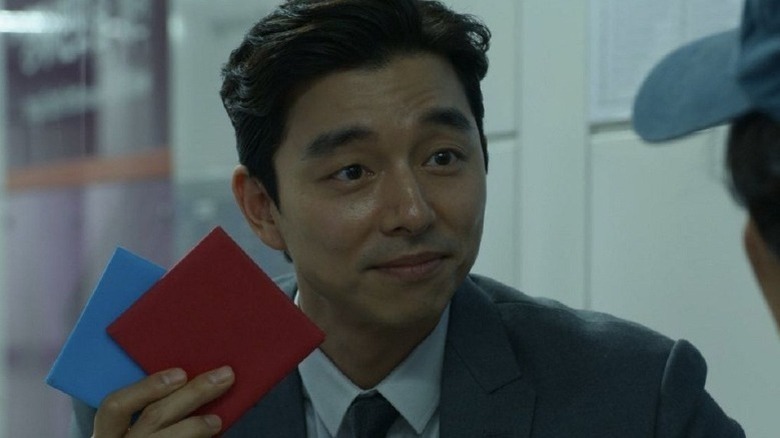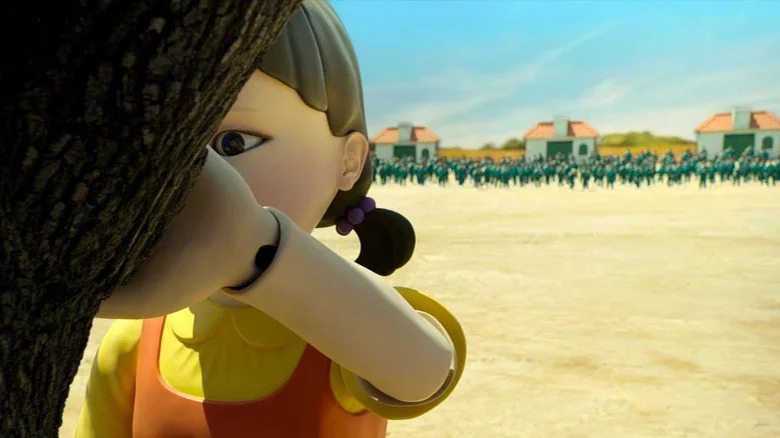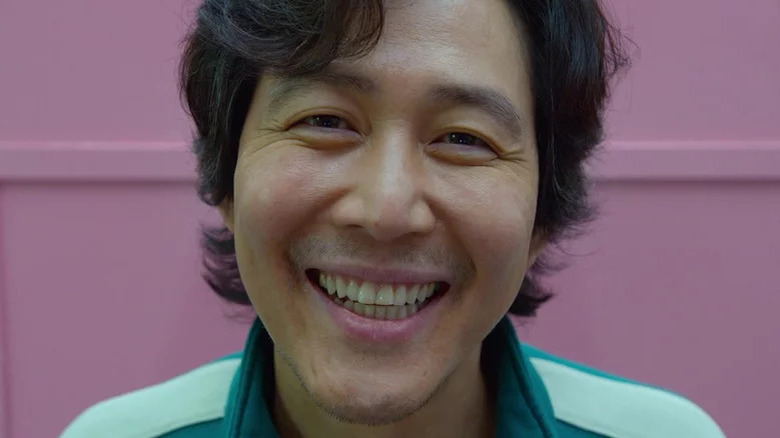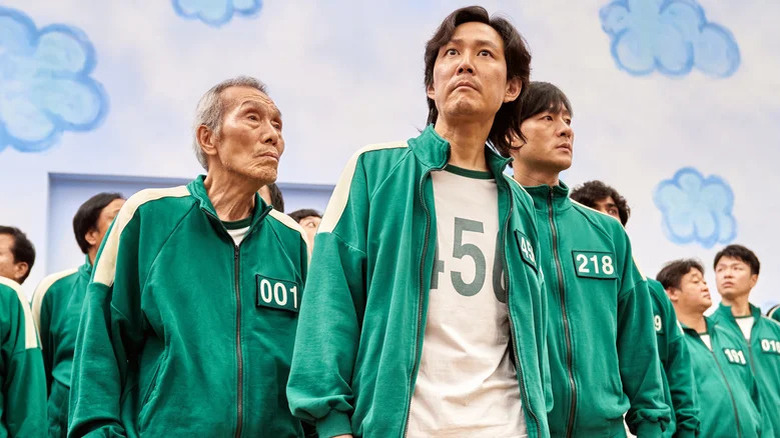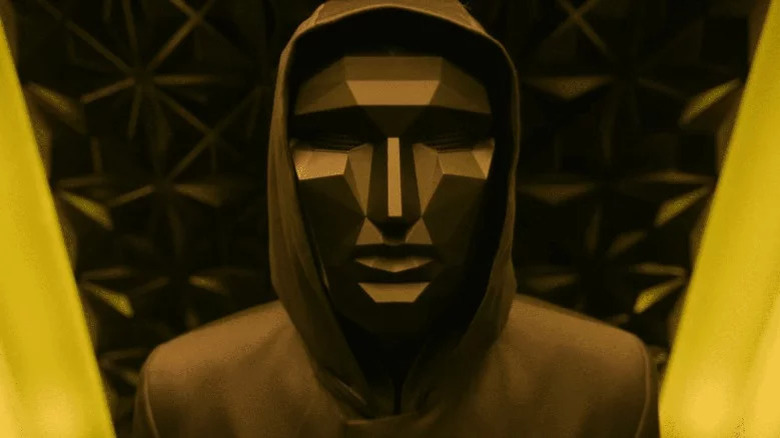Squid Game Season 1 Recap: 5 Things To Remember Before Watching Season 2 On Netflix
Though it only has one season and a reality show spin-off under its belt, Netflix's "Squid Game" has become an international phenomenon that was always going to become a longer series. With only four returning characters in "Squid Game" season 2 and the show ending after season 3, it will be interesting to see where Netflix and series creator Hwang Dong-hyuk plan to take things before the curtain falls ... or, at least, before David Fincher's upcoming "Squid Game" show starts the cycle anew.
The premise of doomed poor souls who compete in lethal games for the amusement of the super-rich makes for a strong allegory in season 1, but can the magic carry over to the sophomore season? Will we learn anything new about the Front Man (Lee Byung-hun) and the other people behind the game? Will the new contestants be as interesting as the characters from season 1? How does Seong Gi-hun (Lee Jung-jae) end up playing the game again? What happened to his red hair from the ending of "Squid Game" season 1? The questions are endless. As such, it's good to refresh our collective memory about the most important events and concepts of the first season before "Squid Game" season 2 premieres on December 26.
The Salesman recruits desperate people for the Squid Game
The Salesman (Gong Yoo) might not be the first "Squid Game" character that springs to mind, but in his own smirking way, he's one of the most important people in the show. A well-dressed businessman who recruits Seong Gi-hun and who knows how many others to the game, he seems to be an expert at targeting broke and desperate individuals. His method of playing the Ddakji envelope-throwing game with the target and substituting money bets for nasty face slaps is an effective way to assess suitably downtrodden players. It's also an early indicator of the Squid Game's true nature; the player gets either wanton violence or a financial benefit, and the odds are heavily stacked toward the former.
The character's core function is to act as the gatekeeper between the drab ordinary world and the awful pastel nether realm of the games. He could be interpreted as a Charon-style ferryman figure or a demonic deceiver archetype who's out to send his victims to the flames. Yoo's cruel, yet oddly charming portrayal certainly plays with the latter, even though the second episode — the appropriately titled "Hell" — questions whether it's actually worse for the players to accept or deny his proposal.
The Salesman is the first Squid Game organization member to show up on screen in season 1, is still at it during the season finale, and will return for season 2. As such, expect the character to continue his role as the game's key recruiter, lurking in the liminal space between utter hopelessness and almost guaranteed death. We may or may not learn more about him as a person, but frankly? We don't really need to. He's got plenty of depth as it stands.
The Squid Game playground is full of deadly games
A large part of the allure of "Squid Game" is the games themselves. The vast majority of season 1 takes place in roomy, elaborately designed indoor locations with vibrant, cutesy colors that deliberately clash with the inevitable blood. Even if the viewer isn't familiar with traditional South Korean playground games, they're invariably easy to follow, and the deadly twists they hide never fail to pack a punch.
Here's a quick recap of the Season 1 games. Things kick off with the "Red Light, Green Light" sneaking challenge against an eerie movement-detecting robot doll, then move on to a stressful Dalgona honeycomb-carving game. Next, the show introduces the idea that collaboration is important in a high-stakes Tug of War, only to change gears by forcing survivors into a life-or-death marble game against a close ally. After a hair-raising, contestant-dropping game of Glass Stepping Stones plunges nearly all remaining players to their doom, it's finally time for the titular Squid Game, a death battle built around the eponymous attack-and-defense game.
Though the players are effectively treated like cattle, they're not actually required to play all the way through and are entitled to a vote on whether they should continue. Thanks to this option, they quite understandably abandon the game after the "Red Light, Green Light" massacre in episode 2 ... but the fact that there are still seven more episodes to go is a pretty good indication of how things play out for the majority of the quitters. "Squid Game" isn't shy of showing just how desperate the players are, and relentlessly rubs this information into the viewer's face as contestants voluntarily return. Presumably, season 2 intends to continue the grim tradition with an updated set of games.
Seong Gi-hun's journey is as important as the game itself
"Squid Game" is a story about hopeless people who play a series of deadly playground games for a tiny chance of riches and a better life. This kind of story needs an emotional center to work — and fortunately, it has just that in the divorced chauffeur Seong Gi-hun, aka Player 456. Though "Squid Game" season 1 features a huge ensemble cast, it does not attempt to hide the fact that it's ultimately the story of Gi-hun. The nine episodes chronicle his personal growth from a gambling, irresponsible slacker to a surprisingly noble figure — and, ultimately, a battle-scarred survivor who's determined to take down the game organization.
While the show generally does a good job of convincing the viewer that just about anyone can die, it doesn't hesitate to place Gi-hun as the central protagonist. "Squid Game" gives him a slightly unconventional hero's journey arc by liberally showcasing his numerous weaknesses and near-falls that he often survives by sheer luck. Nevertheless, Gi-hun's steadily emerging positive traits and constant juxtaposition with his manipulative childhood friend Cho Sang-woo (Park Hae-soo) make it very clear who the audience is supposed to root for.
As the unlikely and reluctant winner of the 2020 Squid Game, Gi-hun is the sole surviving player character from season 1 and seems set to remain front and center in "Squid Game" season 2. Since the teaser trailer confirms that he not only competes in the game again but relies heavily on his past experiences, the character's extensive backstory will likely matter more than ever.
Squid Game Season 1 has a memorable cast that we'll never see again
Going into "Squid Game" season 2, it's important to remember that the show isn't just any old game-themed thriller. It actively makes you care about the characters it's about to gruesomely kill off.
Season 1 takes its sweet time developing many of the characters. Absolute hate sinks like the gangster Jang Deok-su (Heo Sung-tae) are rare, and even otherwise manipulative characters like the increasingly desperate Han Mi-nyeo (Kim Joo-ryoung) and the back-stabbing Cho Sang-woo have redeeming traits. Even though the viewer knows that the players are marching toward their doom, the attention "Squid Game" gives to them means that important deaths hit like a brick. The marble game in Episode 6, "Gganbu," is likely the worst offender here. It's still hard to think of the crestfallen look on Ali Abdul's (Anupam Tripathi) face when he realizes his supposed friend Sang-woo has betrayed him, or Kang Sae-byeok's (HoYeon Jung) desperation when she learns Ji-yeong's (Lee Yoo-mi) backstory and realizes the tormented young woman is about the throw the game on purpose.
Impressively, "Squid Game" season 1 even manages to pull off a twist on the "shocking death" theme, courtesy of Player 001. After an emotionally devastating game of marbles, the elderly Oh Il-nam (Oh Yeong-su) allows Gi-hun to win and is seemingly executed. Then, Gi-hun finds out in the season finale that the old man not only survived but actually created the game back in the day and was merely slumming as a fake player for his own entertainment. Suffice it to say, Il-nam's bedridden death after a final bitter bet with Gi-hun hits extremely differently.
Squid Game is also a story of two brothers
Yes, Seong Gi-hun is the central protagonist. Sure, the show focuses heavily on the games, their players, and the decadent rich folks watching over it all. Still, there's another important thread running throughout "Squid Game" season 1.
For a long time, the show's most obviously heroic figure isn't the downtrodden Gi-hun, but the plucky police detective he goes to meet after temporarily leaving the game in episode 2. Hwang Jun-ho (Wi Ha-joon) is looking for his long-lost brother who disappeared in the same circumstances that Gi-hun describes, and decides to infiltrate the Squid Game organization to find out more. It's through him that we find out how and why the game is set up, and his stealthy James Bond antics are a welcome respite from the relentless hopelessness of the game itself. Then, in the penultimate episode, he comes face to face with the game's operator, Front Man ... who reveals himself to be Jun-ho's brother Hwang In-ho, and shoots the detective, who plummets into the sea.
This kind of abrupt end would fit right into the exits "Squid Game" season 1 generally gives to its characters. However, Jun-ho survived the bullet and the fall and is returning for the sophomore season. What's more, Oh Il-nam's death at the end of season 1 means that In-ho is now the highest-known authority figure in the game. "Squid Game" clearly isn't done with the Hwang siblings quite yet, and their difficult dynamic will likely play an important part in season 2.
